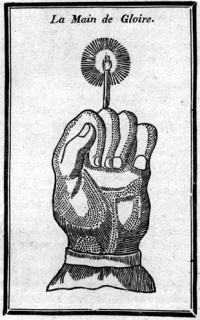Marvellous
From The Art and Popular Culture Encyclopedia
| Revision as of 12:44, 20 August 2007 WikiSysop (Talk | contribs) ← Previous diff |
Current revision Jahsonic (Talk | contribs) |
||
| Line 1: | Line 1: | ||
| + | [[Image:Doré's caricature of Münchhausen.jpg|200px|thumb|left| | ||
| + | [[Doré's caricature of Münchhausen]], a portrait bust of [[Baron Münchhausen]] by French artist [[Gustave Doré]]]] | ||
| + | {| class="toccolours" style="float: left; margin-left: 1em; margin-right: 2em; font-size: 85%; background:#c6dbf7; color:black; width:30em; max-width: 40%;" cellspacing="5" | ||
| + | | style="text-align: left;" | | ||
| + | "To establish contact with the [[mystery|mysterious]] forces which rule the world, to come to terms with them, to obtain their co-operation or complicity, such is the objective of all those who devote themselves to [[magic]] and to whom, rightly or wrongly, people attribute [[supernatural]] powers and a special gift of receptivity to everything [[marvellous]]."--''[[A Pictorial History of Magic and the Supernatural]]'' (1961) by Maurice Bessy | ||
| + | |} | ||
| + | [[Image:Le Voyage dans la lune.jpg|200px|thumb|right|This page '''{{PAGENAME}}''' is part of the [[fantasy]] series.<br><small>Illustration: Screenshot from ''[[A Trip to the Moon]]'' ([[1902]]) [[Georges Méliès]]</small>]] | ||
| + | [[Image:La main de gloire.JPG|thumb|200px|''[[Hand of Glory]]'', anonymous]] | ||
| + | [[Image:Last Judgement.jpg|thumb|right|200px|''[[The Last Judgment (Bosch triptych fragment)]]'' by [[Hieronymus Bosch]]]] | ||
| + | [[Image:Blemmyes (legendary creatures).jpg|thumb|right|200px|[[Blemmyes (legendary creatures)|Blemmyes]] from [[Hartmann Schedel]]'s ''[[Nuremberg Chronicle]]'' ([[1493]])]] | ||
| + | [[Image:Joos de Momper.jpg|thumb|right|200px|''[[Anthropomorphic]] [[Landscape]]'' (early [[17th century]]) by [[Joos de Momper]]]] | ||
| + | |||
| {{Template}} | {{Template}} | ||
| - | The term '''marvelous''' has two meanings. The first is causing wonder or astonishment (such as supernatural phenomena), the second denotes something of the highest or best kind or quality. | + | The term '''marvelous''' has two meanings. The first is causing [[wonder]] or [[astonishment]] and [[surprise]] (such as supernatural phenomena), the second denotes something of the [[highest or best kind or quality]]. |
| - | + | ||
| - | Exciting wonder or [[surprise]]; astonishing; wonderful. | + | |
| - | :''I went to a '''marvellous''' party last week.'' | + | |
| - | + | ||
| - | == Related terms== | + | |
| - | [[fantastic]] - [[greatness]] - [[fantastique]] - [[supernatural]] - [[the uncanny]] | + | |
| == Generic theory of marvelous fiction == | == Generic theory of marvelous fiction == | ||
| - | In [[literary theory]], it is opposed to the [[fantastique]]. In the preface to [[Pierre Mabille]]'s ''Mirror of the Marvelous'', Breton states: "The [[marvellous]] has never been better defined than as being in complete contrast to the [[fantastic]]." [[Tsvetan Todorov]] agrees with this point of view. | + | In [[literary theory]], it is opposed to the [[fantastique]]. In the preface to [[Pierre Mabille]]'s ''[[Mirror of the Marvelous]]'', Breton states: "The [[marvellous]] has never been better defined than as being in complete contrast to the [[fantastic]]." [[Tzvetan Todorov]] agrees with this point of view. |
| ==Etymology== | ==Etymology== | ||
| - | First attested from [[w:1300|1300]], from [[Old French]], from [[merveillos]], from [[merveille]] ''a wonder''. See also: [[marvel]]. | + | First attested from [[1300|1300]], from [[Old French]], from [[merveillos]], from [[merveille]] ''a wonder''. See also: [[marvel]], from Vulgar Latin ''*miribilia'', from Latin ''[[mirabilia]]'' (“wonderful things”), from neuter plural of ''mirabilis'' (“strange, wonderful”), from ''miror'' (“I wonder at”), from ''mirus'' (“wonderful”). |
| == The marvelous is popular == | == The marvelous is popular == | ||
| - | ''The marvelous is popular'' is one of the most often quoted excerpts of [[Ado Kyrou]]'s ''[[Le Surréalisme au cinéma]]''. | + | ''The marvelous is popular'' is one of the most often quoted excerpts of [[Ado Kyrou]]'s ''[[Le Surréalisme au cinéma]]'': |
| - | : "J'abhorre les aristocrates et les aristocraties (de classe ou de n'importe quoi). Qu'ils gardens leurs [[Robert Bresson|Bresson]]s et leurs [[Jean Cocteau|Cocteau]]x. Le [[marvelous|merveilleux]] cinématographique, le merveilleux moderne est [[populaire]] et les meilleurs exemples de films exaltants sont, depuis [[Georges Méliès|Méliès]] et [[Fantômas]], [[Grindhouse|les films des salles de quartiers populaires]], les films qui, paraît-il, n'ont pas leur place dans [[history of film|l'histoire du cinéma]]. --page 100, 2005 edition. | + | |
| - | Translated by | + | :"They can keep their [[Robert Bresson|Bresson]]s and their [[Jean Cocteau|Cocteaus]]. The cinematic, modern '''marvelous is popular''', and the best and most exciting films are, beginning with [[Georges Méliès|Méliès]] and [[Fantômas]], the films shown in [[Grindhouse|local fleapits]], films which seem to have no place in the [[history of cinema]]." --cited in [[Paul Hammond]]'s ''[[The Shadow and its Shadow]]''. |
| - | :"They can keep their [[Robert Bresson|Bresson]]s and their [[Jean Cocteau|Cocteaus]]. The cinematic, modern [[marvelous]] is popular, and the best and most exciting films are, beginning with [[Georges Méliès|Méliès]] and [[Fantômas]], the films shown in [[Grindhouse|local fleapits]], films which seem to have no place in the [[history of cinema]]." --Kyrou, Ado. “The Marvelous is Popular.” | + | In original French: |
| - | This quote was published first in [[Paul Hammond]]'s ''[[The Shadow and its Shadow]]'' anthology and later by [[Joan Hawkins]] in ''[[Cutting Edge]]''. | + | : "J'abhorre les aristocrates et les aristocraties (de classe ou de n'importe quoi). Qu'ils gardens leurs [[Robert Bresson|Bresson]]s et leurs [[Jean Cocteau|Cocteau]]x. Le [[marvelous|merveilleux]] cinématographique, '''le merveilleux moderne est populaire''' et les meilleurs exemples de films exaltants sont, depuis [[Georges Méliès|Méliès]] et [[Fantômas]], [[Grindhouse|les films des salles de quartiers populaires]], les films qui, paraît-il, n'ont pas leur place dans [[history of film|l'histoire du cinéma]]. --page 100, 2005 edition. |
| - | == As seen by Breton == | ||
| - | :"Let us not mince words: the marvelous is always beautiful, anything marvelous is beautiful, in fact only the marvelous is beautiful." --[[Surrealist Manifesto]] (1924) - André Breton | ||
| - | == On Lem on Todorov by Robert Scholes == | + | == The marvelous is always beautiful == |
| + | André Breton, in the first [[Surrealist Manifesto]] (1924) said: | ||
| - | :"Historically speaking, prior to what we refer to as the "Enlightenment," there could be no such [[hesitation]] [by which Todorov defined [[fantastique|the fantastic]]]. The [[supernatural]] was accepted as a part of life. Witches and God co-existed with men and women, and a story could, in Todorov's terms, be "marvelous," but never "fantastic." Examples abound: Sinbad the Sailor, [[fairy tale]]s, [[chivalric romance]]s. At the other end—our end—of the nineteenth century, with the psychoanalytic discovery of the [[unconscious]], there is again no hesitation. The witness to bizarre events, or at least the reader of the story, knows them to be the creations of his or her own mind. A story then may be "strange" (étrange, inexplicably translated as "[[uncanny]]" by Richard Howard), but, again, never "fantastic," science fiction and Todorov's careless remarks about it notwithstanding. For Todorov, science-fiction is a species of the marvelous, but the sense in which "robots, extraterrestrial beings, the whole interplanetary context" are supernatural is entirely different. Here the marvelous and the strange intersect without creating that cognitive hesitation characteristic of the fantastic, for the explanation of the events, while currently impossible (we as yet know no interplanetary beings) is implicitly rational (we recognize the possibility that we will know such beings in another time)." --[http://www.depauw.edu/sfs/backissues/6/lemtodorov6forum.htm On Lem on Todorov by Robert Scholes] | + | :"Let us not mince words: the marvelous is always beautiful, anything marvelous is beautiful, in fact only the marvelous is beautiful." |
| - | + | ==Namesakes== | |
| - | [[Robert Scholes]] | + | *''[[Marvellous Méliès]]'' (1974), an analysis of the work of French filmmaker Georges Méliès by Paul Hammond. |
| + | == Related terms== | ||
| + | *[[Fantastic]] | ||
| + | *[[Fantastique]] | ||
| + | *[[Supernatural]] | ||
| + | *[[The uncanny]] | ||
| {{GFDL}} | {{GFDL}} | ||
Current revision

|
"To establish contact with the mysterious forces which rule the world, to come to terms with them, to obtain their co-operation or complicity, such is the objective of all those who devote themselves to magic and to whom, rightly or wrongly, people attribute supernatural powers and a special gift of receptivity to everything marvellous."--A Pictorial History of Magic and the Supernatural (1961) by Maurice Bessy |

Illustration: Screenshot from A Trip to the Moon (1902) Georges Méliès

|
Related e |
|
Featured: |
The term marvelous has two meanings. The first is causing wonder or astonishment and surprise (such as supernatural phenomena), the second denotes something of the highest or best kind or quality.
Contents |
Generic theory of marvelous fiction
In literary theory, it is opposed to the fantastique. In the preface to Pierre Mabille's Mirror of the Marvelous, Breton states: "The marvellous has never been better defined than as being in complete contrast to the fantastic." Tzvetan Todorov agrees with this point of view.
Etymology
First attested from 1300, from Old French, from merveillos, from merveille a wonder. See also: marvel, from Vulgar Latin *miribilia, from Latin mirabilia (“wonderful things”), from neuter plural of mirabilis (“strange, wonderful”), from miror (“I wonder at”), from mirus (“wonderful”).
The marvelous is popular
The marvelous is popular is one of the most often quoted excerpts of Ado Kyrou's Le Surréalisme au cinéma:
- "They can keep their Bressons and their Cocteaus. The cinematic, modern marvelous is popular, and the best and most exciting films are, beginning with Méliès and Fantômas, the films shown in local fleapits, films which seem to have no place in the history of cinema." --cited in Paul Hammond's The Shadow and its Shadow.
In original French:
- "J'abhorre les aristocrates et les aristocraties (de classe ou de n'importe quoi). Qu'ils gardens leurs Bressons et leurs Cocteaux. Le merveilleux cinématographique, le merveilleux moderne est populaire et les meilleurs exemples de films exaltants sont, depuis Méliès et Fantômas, les films des salles de quartiers populaires, les films qui, paraît-il, n'ont pas leur place dans l'histoire du cinéma. --page 100, 2005 edition.
The marvelous is always beautiful
André Breton, in the first Surrealist Manifesto (1924) said:
- "Let us not mince words: the marvelous is always beautiful, anything marvelous is beautiful, in fact only the marvelous is beautiful."
Namesakes
- Marvellous Méliès (1974), an analysis of the work of French filmmaker Georges Méliès by Paul Hammond.
Related terms

.jpg)


